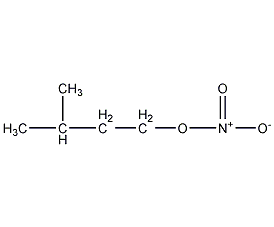
Structural formula
| Business number | 05M7 |
|---|---|
| Molecular formula | C5H11NO3 |
| Molecular weight | 133.15 |
| label |
3-Methyl-1-butanol nitrate, Nitroisoamyl ester, 1-Methylbutyl nitrate, 3-Methylbutyl Nitrate, For drug synthesis |
Numbering system
CAS number:543-87-3
MDL number:None
EINECS number:None
RTECS number:NT0187000
BRN number:None
PubChem ID:None
Physical property data
1. Properties: colorless liquid.
2. Density (g/ cm3, 22/4℃): 0.996
3. Relative steam density (g/cm3 , air=1): Undetermined
4. Melting point (ºC): <-60
5. Boiling point (ºC, normal pressure): 147-148
6. Boiling point (ºC, 8kPa): Undetermined
7. Refractive index (22ºC): 1.4122
8. Flash point (ºC): 51.7
9. Specific rotation (º): Undetermined
10. Autoignition point or ignition temperature (ºC): Undetermined
11. Vapor pressure ( kPa, 25ºC): Undetermined
12. Saturated vapor pressure (kPa, 55.1ºC): Undetermined
13. Heat of combustion (KJ/mol): Undetermined
14. Critical temperature (ºC): Undetermined
15. Critical pressure (KPa): Undetermined
16. Oil-water (octanol/water) partition coefficient Log value: Undetermined
17. Explosion upper limit (%, V/V): Undetermined
18. Explosion lower limit (%, V/V): Undetermined
19. Solubility: Slightly soluble in water, soluble in alcohol and ether.
Toxicological data
1. Acute toxicity: mouse intraperitoneal LD50: 480mg/kg, behavior – lethargy (common depressive activity);
2. Inhalation and ingestion are harmful to the body and irritating to the eyes and skin. sex.
Ecological data
This substance may be harmful to the environment, and special attention should be paid to water bodies.
Molecular structure data
1. Molar refractive index: 32.93
2. Molar volume (cm3/mol): 130.5
3. Isotonic specific volume (90.2K ): 306.6
4. Surface tension (dyne/cm): 30.4
5. Polarizability (10-24cm3): 13.05
Compute chemical data
1. Hydrophobic parameter calculation reference value (XlogP): None
2. Hydrogen bond donor�Number of bonds: 0
3. Number of hydrogen bond acceptors: 3
4. Number of rotatable chemical bonds: 3
5. Number of tautomers :None
6. Topological molecule polar surface area 55
7. Number of heavy atoms: 9
8. Surface charge: 0
9. Complexity: 86.7
10. Number of isotope atoms: 0
11. Determined number of atomic stereocenters: 0
12. Uncertain atoms Number of stereocenters: 0
13. Determine the number of stereocenters of chemical bonds: 0
14. Uncertain number of stereocenters of chemical bonds: 0
15. Number of covalent bond units: 1
Properties and stability
Colorless liquid. It is easy to burn and decompose when exposed to open flames or high heat, releasing toxic gases.
Storage method
Stored in a cool, dry and well-ventilated warehouse. Keep away from fire and heat sources. Protect from direct sunlight. The packaging is sealed. They should be stored separately from acids and food chemicals, and avoid mixed storage. Suitable materials should be available in the storage area to contain spills.
Synthesis method
It is produced by the direct esterification of isoamyl alcohol and nitric acid in the presence of urea, but it is generally a mixture of isomers and must be separated and refined to obtain pure crystals.
Purpose
Used as solvent, pharmaceutical synthesis or chemical reagent.

 微信扫一扫打赏
微信扫一扫打赏

